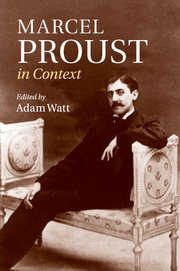Book contents
- Frontmatter
- Contents
- List of Illustrations
- Notes on contributors
- Figure I. Marcel Proust, portrait in oils by Jacques-Émile Blanche, 1892
- Preface
- Figure 2. Proust photographed on his death-bed by Man Ray, 1922
- Note on the text
- Chronology
- Part I Life and works
- Part II Historical and cultural contexts
- i. The arts
- ii. Self and society
- Chapter 14 Freud and psychoanalysis
- Chapter 15 Sexuality
- Chapter 16 Health and medicine
- Chapter 17 Technology and science
- Chapter 18 Religion
- Chapter 19 Travel
- Chapter 20 Journalism
- Chapter 21 Politics and class
- Chapter 22 The Dreyfus Affair
- Chapter 23 The First World War
- Part III Critical reception
- Further reading
- Index
- References
Chapter 20 - Journalism
from ii. - Self and society
Published online by Cambridge University Press: 05 November 2013
- Frontmatter
- Contents
- List of Illustrations
- Notes on contributors
- Figure I. Marcel Proust, portrait in oils by Jacques-Émile Blanche, 1892
- Preface
- Figure 2. Proust photographed on his death-bed by Man Ray, 1922
- Note on the text
- Chronology
- Part I Life and works
- Part II Historical and cultural contexts
- i. The arts
- ii. Self and society
- Chapter 14 Freud and psychoanalysis
- Chapter 15 Sexuality
- Chapter 16 Health and medicine
- Chapter 17 Technology and science
- Chapter 18 Religion
- Chapter 19 Travel
- Chapter 20 Journalism
- Chapter 21 Politics and class
- Chapter 22 The Dreyfus Affair
- Chapter 23 The First World War
- Part III Critical reception
- Further reading
- Index
- References
Summary
Proust between two dailies: Le Figaro and Le Temps
Just a few years after Émile Zola published his earth-shaking series of pro-Dreyfus articles in Le Figaro (November–December 1897), Marcel Proust became a regular contributor to the paper with a series of society columns and pastiches. Zola, at the height of his literary glory, was able to secure in the pages of Le Figaro a conspicuous venue for his fiery defence of Dreyfus. Proust, at the threshold of a career in letters, signed his society columns with a pseudonym and carefully guarded his incognito. He was to maintain an uneasy distance between journalism and literature throughout his writing life.
The contrast between these two instances of journalism – between Zola's public indictment of the French justice system and Proust's discreet chronicles of his visits to literary and artistocratic salons – tells us as much about the life of the French press as it does about Zola and Proust as journalists. How had Le Figaro evolved in those six years between Zola's dreyfusard articles and Proust's first society column (‘Le salon de S.A.I. la princesse Mathilde’, 25 February 1903)? The numbers tell it all: Le Figaro's circulation, from a robust 80,000 copies at the end of the nineteenth century, dropped to 20,000 in the heat of the Dreyfus Affair. Conservative and moderately republican, with an artistocratic and high-bourgeois readership, Le Figaro assumed a surprisingly pro-Dreyfus stance from the start of the Affair and lost subscribers by the thousands. Zola himself notes that he barely got his third article on the Affair, ‘Procès-Verbal’ (5 December 1897), into the newspaper's troubled pages as its readers abandoned it. By the time Proust's series of ‘Salons’ began appearing in Le Figaro, the paper's fortunes were on the rise again. Under the leadership of Gaston Calmette, it had recovered its traditionally conservative profile and minimized its coverage of politics. Readers were returning to an elegant Figaro which gave ample press to arts and letters, fêtes mondaines, and the growing world of sports.
- Type
- Chapter
- Information
- Marcel Proust in Context , pp. 153 - 159Publisher: Cambridge University PressPrint publication year: 2013



